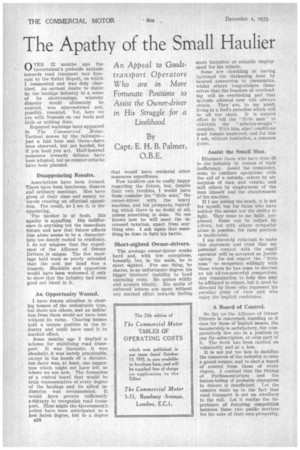The Apathy of the Small Haulier
Page 46

If you've noticed an error in this article please click here to report it so we can fix it.
0 VE 'It 12 months ago the Government's probable attitude towards road transport was forecast by the Salter Report, on which 1 commented and was duly chastised. An earnest desire to shake up the haulage industry to a sense of its shortcomings, whereby disaster would ultimately be courted, was misconstrued and, possibly, resented. Yet, here we are with Nemesis on our heels and little or nothing done.
Repeated warnings have appeared In The Commercial Motor.
Tactical moves by the railways— just a hint here and there—have been observed, but not heeded, for if you heed you act. Half-hearted measures towards defence have been adopted, but no counter-attacks have been planned.
Disappointing Results.
Associations have been formed. There have been luncheons, dinners and ordinary meetings. Men have given of their time and money towards creating an effectual opposition. The result, as I see it, is disappointing.
The haulier is at fault. His apathy is appalling. His indifference to anything but the immediate future and how that future affects him alone seems to be a characteristic too deeply rooted to eradicate. I do not suppose that the experience of the Alliance of Owner Drivers Is unique. The few meetings held were so poorly attended that the cost per head was a tragedy. Hecklers and opposition would have been welcomed if only to show that the industry had some good red blood in it.
An Opportunity Wasted.
I have drawn attention to clearing houses of the undesirable type, but there are others, and an indication from them would not have been without its value. Clearing houses hold a unique position in the industry and could have used it to marked effect.
. Some months ago I drafted a scheme for stabilizing road transport. It was fantastic, it was idealistic, it was barely practicable, except in the hands of a dictator, hit there was, at least, one suggestion which might not have left us where we are now. The formation of a control board that would be truly representative of every degree of the haulage and its allied industries was recommended. It would have powers sufficiently arbitrary to reorganize road transport. Thus might the Governments action have been anticipated to a less harsh degree, but to a degree
B28 4 that would have rendered other measures superfluous.
Few hauliers can be really happy regarding the future, but, despite their own troubles, I would have them consider the "little man," the owner-driver with the heavy machine, and his prospects, regarding which there is no doubt at all, unless something is done. No one knows how he will meet the increased taxation, apart from anything else. I ask again that something be done to fight his battle.
Short-sighted Owner-drivers.
The average owner-driver works hard and, with few exceptions, honestly, but, in the main, he is short sighted. For one thing, be shares, to an unfortunate degree, his bigger brothers' inability to heed operating costs. He quotes wildly and accepts blindly. His spells of enforced leisure are spent without any marked effect towards finding more lucrative or suitable employment for his vehicle.
Some are chuckling at having lightened the darkening hour by belated conversion to pneumatics, whilst others congratulate themselves that the freedom of overloading will -be everlasting and that latitude allowed now will always obtain. They are, to my mind, living in a fool's paradise which will be all too short. It is wasted effort to tell the "little man" to cultivate the " unladen-weight " complex. With him, alas! conditions must remain unaltered, and for him ask, without hesitation, a common purse.
Assist the Small Man.
Eliminate those who have done ill to the industry by reason of their inefficiency. Assist the remainder, some to' continue operations with the aid of a subsidy, others by absorption of man and vehicle, And still others by employment of the man himself and the abandonment of his machine.
If I am asking too much, it is not for myself, but for those who have neither the means nor the ability to light. They come to tine daily, perplexed. Some can be helped by advice, but with others sympathy alone is possible, for their position is unalterable.
I am aincerely reluctant to make this statement and trust that my personal contact with the small operator will be accepted as justification. Do not expect • the "little man" to co-operate willingly with those whom he has come to distrust as his all-too-powerful competitors. Any organization to help him may be affiliated to others, but it must be directed by those who represent his peculiar point of view and who enjoy his implicit confidence.
A Board of Control.
So far as the Affiance of Owner Drivers is concerned, standing as it does for those of limited means, the membership is satisfactory, but comparatively few are in a position to pay the subscription, or even part of it. The work has been carried on voluntarily and at loss.
It is not yet too late to mobilize the resources of the industry to take a grand census, and to elect a board of control from those of every degree. I contend that the feteing of Parliamentarians and the button-holing of probable champions in debate is insufficient. Let the country wake up to the fact that road transport is not an auxiliary to the rail. Let it realize the importance of fostering competition between these two public services for the sake of their own prosperity.




































































































